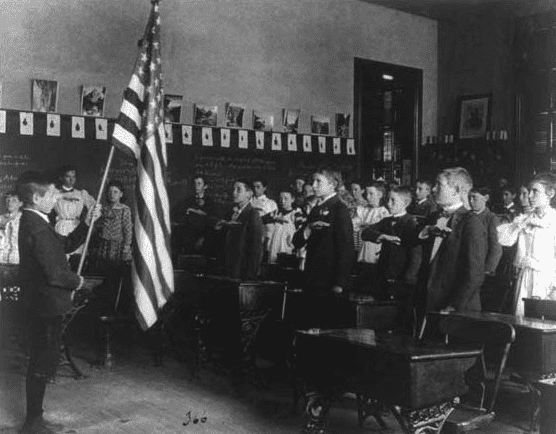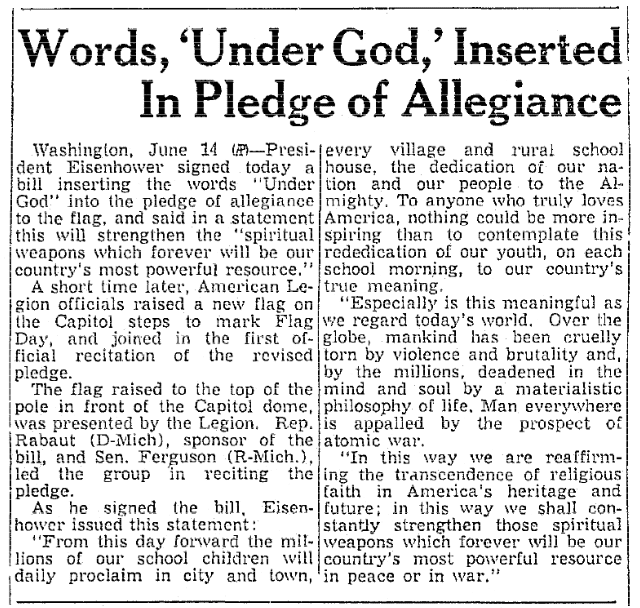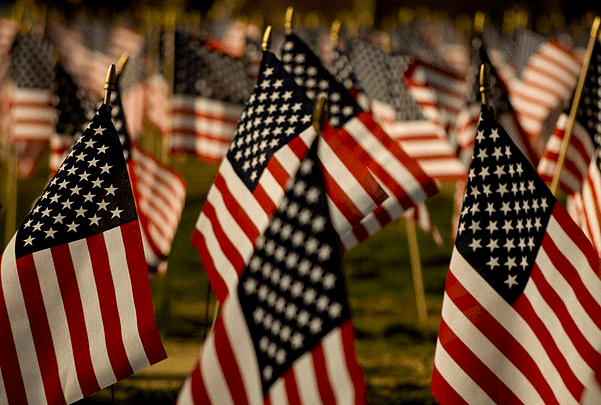The Pledge of Allegiance is a patriotic oath swearing loyalty to the American flag and nation. Originally written by Colonel George Balch in 1887 and revised by Francis Bellamy in 1892, the Pledge of Allegiance was formally adopted by Congress in 1942.
Since its creation the pledge has been modified four times, with the latest change the most controversial: on Flag Day, 14 June 1954, President Dwight D. Eisenhower signed a bill inserting the words “under God” into the pledge. This change, although heartily welcomed by many, caused some critics to worry about the separation of church and state stipulated in the U.S. Constitution.
The revised 1954 pledge has remained intact ever since: “I pledge allegiance to the flag of the United States of America, and to the republic for which it stands, one nation under God, indivisible, with liberty and justice for all.” It is recited by schoolchildren in about half of the states, as well as the opening of every session of Congress, many government meetings, and such organizations as the Rotary Club and the Boy Scouts of America.

The following five newspaper articles are about the addition of the words “under God” to the Pledge of Allegiance. The first two are news reports of the revised pledge, the next two are editorials favoring the modification, and the fifth is a letter to the editor expressing concern that the nation is forgetting to maintain a separation between church and state.

Here is a transcription of this article:
Words ‘Under God’ Inserted in Pledge of Allegiance
Washington, June 14. (AP) – President Eisenhower signed today a bill inserting the words “under God” into the pledge of allegiance to the flag, and said in a statement this will strengthen the “spiritual weapons which forever will be our country’s most powerful resource.”
A short time later, American Legion officials raised a new flag on the Capitol steps to mark Flag Day, and joined in the first official recitation of the revised pledge.
The flag raised to the top of the pole in front of the Capitol dome was presented by the Legion. Rep. Rabaut (D-Mich.), sponsor of the bill, and Sen. Ferguson (R-Mich.), led the group in reciting the pledge.
As he signed the bill, Eisenhower issued this statement:
“From this day forward the millions of our school children will daily proclaim in city and town, every village and rural schoolhouse, the dedication of our nation and our people to the Almighty. To anyone who truly loves America, nothing could be more inspiring than to contemplate this rededication of our youth, on each school morning, to our country’s true meaning.
“Especially is this meaningful as we regard today’s world. Over the globe, mankind has been cruelly torn by violence and brutality and, by the millions, deadened in the mind and soul by a materialistic philosophy of life. Man everywhere is appalled by the prospect of atomic war.
“In this way we are reaffirming the transcendence of religious faith in America’s heritage and future; in this way we shall constantly strengthen those spiritual weapons which forever will be our country’s most powerful resource in peace or in war.”
Here is a transcription of this article:
New Pledge Has Debut at Capital
Washington (INS) – The newly revised pledge of allegiance to the flag was recited for the first time Monday in Flag Day ceremonies on the steps of the U.S. Capitol.
President Eisenhower signed the legislation authorizing insertion of the words “under God” and authors of the law – Representative Louis Rabaut, Democrat-Michigan, and Senator Homer Ferguson, Republican-Michigan, recited it officially for the first time 13 minutes later.
The new pledge is as follows: “I pledge allegiance to the flag of the United States of America and to the republic for which it stands: one nation under God, indivisible, with liberty and justice for all.”
Here is a transcription of this editorial:
‘Under God’
If, as some historians say, the United States of American really began when John Hancock as president of the Continental Congress affixed his signature to the Declaration of Independence July 4, 1776, then the resolution passed by the current Congress becomes more significant. That resolution added the words, “under God,” to the pledge of allegiance to the flag.
It was plain in the Continental Congress that this nation was to be predicated on a divine basis. The “unalienable rights” are endowed by the Creator. The separation from England was declared in the name of “Nature’s God.” Lord Bryce recognized the divinity of our government as one of its distinctive features.
Probably there was good cause for what Congress has just done. Advocates of world government have raised a storm of protest in this country from those who fear our form of government might lose its distinctive features, as well as its identity. Belief in a Supreme Being is one of those features.
Communism boasts that it recognizes no supreme authority but the state. This country was conceived on a different basis.
Here is a transcription of this editorial:
Under God
President Eisenhower has signed a bill to revise the Pledge of Allegiance so it now will read: “I pledge allegiance to the flag of the United States of America and to the republic for which it stands: one nation under God, indivisible, with liberty and justice for all.”
We like the comment of the woman who said: “I’m glad it’s done. I’ve been saying the pledge that way, mentally, for years.”
Here is a transcription of this letter:
What Is Happening?
Editor, The Times:
One of our women lawmakers is reported planning to introduce legislation to grant to Billy Graham, evangelist, a subsidy to finance the spreading of his particular type of persuasion throughout the world.
That such a bill – requiring every taxpayer to contribute to the upkeep of Billy Graham and his troupe – will receive unchallenged passage, there is little doubt, considering the speed with which the Senate adopted the resolution to insert the words “under God” in our oath of allegiance, which requires that every man, woman and child, regardless of personal conviction, shall say the words “under God” when pledging allegiance to our flag and country.
What has happened to the constitutional guarantee separating church and state? Were our Founding Fathers jesting when they stipulated that “Congress shall make no law respecting an establishment of religion”?
Late developments would make it appear that separation of church and state, once a fundamental principle in the American theory of government, is now a thing of the past.
–J. I. McKay, Bremerton.
Note: An online collection of newspapers, such as GenealogyBank’s Historical Newspaper Archives, is not only a great way to learn about the lives of your ancestors – the old newspaper articles also help you understand American history and the times your ancestors lived in, and the news they talked about and read in their local papers.
